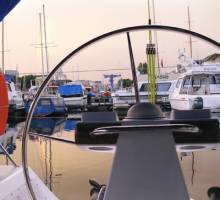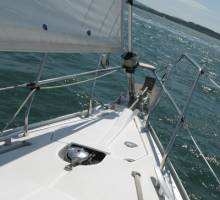
The top 5 mistakes when buying a yacht
What are the most common mistakes that people make when choosing and buying a yacht? Here are the top 5 don'ts to be avoided when investing in a yacht purchase. Many thanks to Duncan Kent for putting this article together.
Buying too large a yacht to handle
One of the simplest mistakes to make is thinking that you need a much larger boat than you actually do. Apart from the additional cost of berthing and maintaining her in a seaworthy condition, too big a yacht will often mean you will always need a crew to help you sail her. Finding a crew to fit in with your sailing plans isn’t always as easy as it sounds and can end up costing you a good deal more in the long run. Whereas a smaller, easier to handle (especially in a marina) boat will nearly always get used more frequently because the owners feel they can simply pop down and go for a quick sail, rather than having to muster a crew and organise dates and travel plans to the letter. Complicated crew logistics will take all the spontaneity out of owning a yacht, which is often the most alluring part of the dream.
Not budgeting for the extras
It’s all too tempting, when buying a new yacht, to look at the salesman’s offer price (particularly at boat shows) and think – I can just about afford that. In reality the price you end up paying to get her on the water will most likely be some 20-percent higher. All new yachts will need electronic instrumentation (possibly around £5,000) and you’re most likely to want to add at least the basic comforts if you’re planning to have the family on board for any length of time (at least another £5,000 for a cruising yacht). Then there is all the safety equipment, which, if this is your first boat and you haven’t already accumulated a lot of personal safety gear, will probably set you back a few thousand pounds as well.
Buying a hull and deck or restoration project without enough funds or time
It can be all too tempting to buy an old wreck or a bare hull and deck just to get into sailing on the cheap. Sadly, unless you are completely aware of the cost and time that will be needed to complete the renovation or fit-out, this can often just end up spoiling the dream. I have seen too many new boat owners all excited after buying an uncared for, dilapidated old boat, thinking they will ‘soon have her back in fine fettle’. But then every time they fix one problem another raises its ugly head and they have to dig even deeper into their cruising funds. When looking at a restoration project or major fitting out task, it is absolutely essential to know what you’re getting yourself into, or you could end up like hundreds of others who have learned the hard way – often forced to sell their pride and joy for a song due to lack of funds or time to carry out and complete the job.
Choosing an ocean-going yacht when an coastal cruiser would do
I’ve lost count of the number of newcomers into sailing who have asked me what the ideal ‘starter boat’ should be and then gone out and bought something much larger and more capable. Really, your first boat should ideally be a stable, solid, inexpensive old workhorse in which you can refine your sailing technique and perfect your close-quarter handling under power, without the constant worry of damaging the boat. Everyone will bounce off pontoons, ride over buoys and scrape chains all over their topsides at first – so why do it on a nice, shiny new boat?
Furthermore, until you’ve gained a reasonable amount of experience you’re unlikely (except in maybe a very few cases) to want to go much further offshore than 20 miles, so buying an ocean-going blue water cruiser as a first boat makes little sense – either practically or economically.
Not considering the running costs
Don’t forget to factor in the running costs of the yacht before you actually buy her. Keeping a big boat in a marina can set you back many thousands of pounds each year – on top of the winter haul-out, antifouling, engine servicing, sail repairs and laundering etc. Some folk can end up paying more in running costs in a couple of years than they paid for the boat itself! Starting with a trailer-sailer that can be kept on the drive at home and towed/launched only when you feel like sailing, is a very economic way of discovering whether you and your family really enjoy being on the water enough to consider investing in a larger yacht – and taking on the extra liabilities that come with it.
Of course, the best thing to do when buying a yacht is to seek the opinion of experts – and there’s no better source of information and advice than Boatshed London. If you would like some help in avoiding these and other pitfalls, call Brian on +44(0)7850 086802.




